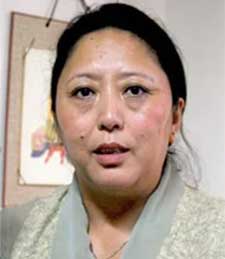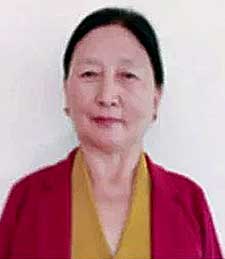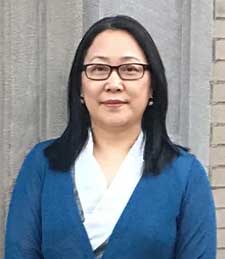The 17th Tibetan Parliament-in-Exile, which convened on Oct. 11-12, 2021, have confirmed three ministers to President Penpa Tsering’s Cabinet while rejecting his two other nominations.
Dolma Gyari, Tharlam Dolma Changra and Norzin Dolma were confirmed by the parliament on Oct. 11. Dolma Gyari received a total of 30 votes out of 45 while Tharlam Dolma and Norzin Dolma received 27 votes each.
Although in the past there have been female members of the Cabinet, this is the first time that three females are in the Cabinet at the same time.
Dolma Gyari previously served both as a member of parliament and as “kalon” (minister), while Tharlam Dolma also served in the parliament.
The Charter of the Tibetans-In-Exile stipulates that the “sikyong” (president) can nominate not more than seven Cabinet members. Two other nominations for Thupten Lungrig and Tsultrim Dorjee failed to secure the required number of votes by the parliament.
However, the parliament could not take up two additional nominations after a section of members walked out in protest against the nomination of Ngodup Dorjee, resulting in the absence of a quorum. Sikyong Penpa Tsering announced on the second day of the parliament that he was withdrawing the submission of the remaining two names for confirmation at this time and hoped the parliament could take them up in a later session.
The portfolio of the three newly elected ministers is expected to be announced in the coming days.
The two-day session of Tibetan Parliament became possible after the Dalai Lama, at the request of all the elected members, broke a prevailing impasse over oath-taking by recommending that all members take their swearing-in oath as per the Charter.
The members were elected in April 2021, but the parliament could not convene as scheduled thereafter due to the disagreement on the interpretation of the Charter. The elected members finally resolved to request the Dalai Lama’s guidance, after which they unanimously decided to take their oaths under the Charter and elected Khenpo Sonam Tenphel as the speaker and Dolma Tsering as the deputy speaker on Oct. 8, 2021. This started the work of the new parliament.
Brief biography of Dolma Gyari
 Dolma Gyari completed high school at the Central School for Tibetans in Darjeeling, India in 1981. She received her bachelor degree from Panjab University in Chandigarh in 1985. She pursued a bachelor of laws from Delhi University between 1985 and 1988.
Dolma Gyari completed high school at the Central School for Tibetans in Darjeeling, India in 1981. She received her bachelor degree from Panjab University in Chandigarh in 1985. She pursued a bachelor of laws from Delhi University between 1985 and 1988.
She served as the president of the Foreign Students Association of Government College for Girls, Panjab University. She was also a board member of the Tibetan Youth Congress from 1986 to 1991.
In 1991, at the age of 26, she was elected to the Tibetan Parliament-in-Exile (then known as the Assembly of Tibetan People’s Deputies), becoming the youngest person to be elected. She was re-elected for three consecutive terms thereafter. She also became the first female deputy speaker of the Tibetan Parliament in-Exile and served in that role for two terms.
She was nominated by Sikyong Lobsang Sangay as a minister in his cabinet and served in that position for a term, from 2011 to 2016, overseeing the Department of Home.
Brief biography of Tharlam Dolma Changra
 Tharlam Dolma Changra completed her schooling in Gangtok, Bylakuppe, and Nirmala Convent school in Mysore. She completed her undergraduate studies from Mysore University’s Teresian College in 1975. She completed her bachelor of education degree from St. Joseph’s in Mysore.
Tharlam Dolma Changra completed her schooling in Gangtok, Bylakuppe, and Nirmala Convent school in Mysore. She completed her undergraduate studies from Mysore University’s Teresian College in 1975. She completed her bachelor of education degree from St. Joseph’s in Mysore.
Tharlma Dolma has served for over 37 years in Tibetan schools in India, including 14 years as teacher and 23 years as principal. In 2013, she received the National Award for Teachers from Indian President Abdul Kalam and also retired the same year.
Tharlam Dolma also served as board member of Dalhousie Public School and Dalhousie Hill Top School and is a member of the Tibetan Department of Education’s Education Council and Advisory Committee and a governing council member of the Dalai Lama Institute for Higher Education based in Bengaluru.
Brief biography of Norzin Dolma
 Norzin Dolma did her basic schooling from Central School for Tibetans in Kollegal and Shimla. She completed her undergraduate and graduate studies from Mysore University. She did her additional graduate studies at Fletcher School (Tufts University) and Harvard University from 2006 to 2008 as part of the Tibetan Scholarship Program. In 2012, she received a bachelor of library and information science degree from Mysore University.
Norzin Dolma did her basic schooling from Central School for Tibetans in Kollegal and Shimla. She completed her undergraduate and graduate studies from Mysore University. She did her additional graduate studies at Fletcher School (Tufts University) and Harvard University from 2006 to 2008 as part of the Tibetan Scholarship Program. In 2012, she received a bachelor of library and information science degree from Mysore University.
She worked as a researcher at the Tibetan Centre for Human Rights and Democracy in Dharamsala. After her further studies in the United States, she returned to Dharamsala and worked as the head of the United Nations, European Union and Human Rights desk in the Department of Information and International Relations. She subsequently immigrated to the United States and worked in the Tibet Fund in New York.
Learn more about the three new ministers.
Brief biographies of the speaker and deputy speaker

Khenpo Sonam Tenphel and Dolma Tsering
Khenpo Sonam Tenphel was born in Rekhe, eastern Tibet in 1974, receiving his primary education there, both in a school and in a local monastery. He fled to India in 1993, completing his monastic education from Namdroling Monastery in Bylakuppe, south India. After completing his intensive Buddhist studies in 2003, he was appointed as a disciplinarian at Namdroling Monastery. He is serving his fourth term in the Tibetan Parliament and had served both as a deputy speaker and a speaker. He was elected as speaker on Oct. 8.
Dolma Tsering was born in 1956 at Dagne in central Tibet. After coming into exile and completing her schooling, she served for 26 years as a teacher in various Tibetan schools. She was also a beneficiary of the Tibetan Scholarship Program and studied special education in the United States. She is serving her fifth term as a member of the parliament. She was elected as deputy speaker on Oct. 8.

